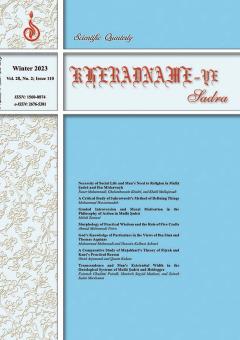God’s Knowledge of Particulars in the Views of Ibn Sīnā and Thomas Aquinas
Subject Areas : Studies on Islamic philosophy and wisdomMohammad Mahmoodi 1 , Hossein Kalbasi Ashtari 2
1 - PhD Candidate of Islamic Philosophy (corresponding author), Farabi Campus, University of Tehran, Tehran, Iran
2 - Professor at Philosophy Department, Allameh Tabataba’i University, Tehran, Iran
Keywords: philosophical theology, divine knowledge, God’s Knowledge of particulars, Peripatetic philosophy, Ibn Sīnā, Thomas Aquinas ,
Abstract :
One of the fundamental questions in the field of philosophical theology is whether God has the knowledge of particulars. Some philosophers have tried to either demonstrate or deny the divine knowledge of particulars regardless of the term “God”, which is a controversial issue. In a philosophical tradition that began with Plato and Aristotle and was advocated by Ibn Sīnā, the divine knowledge of particulars is denied. However, within the framework of the same philosophical school, Thomas Aquinas, as a theologian, demonstrates this knowledge for God. In Ibn Sīnā’s view, there is a fundamental difference between quiddity and existence as two different levels of being. The Necessary Being is the cause of granting existence to quiddities and, thus, cannot know them in terms of their particulars, as they lack “existence” in separation from Him. However, Ibn Sīnā does not deny the divine knowledge of particulars through their “existence”. In Aquinas’ theological concept of God, as a personal God, the denial of the divine knowledge of particulars defaces the divine power. Moreover, in case of denying this Knowledge, Man, who is created by God, will be placed at a higher level than their Creator because they can gain the knowledge of particulars. Aquinas, who speaks as a theologian here, ignores the borderline between philosophy and theology and objects to Ibn Sīnā by stating that some universals such as “animal” and “human” cannot function as the distinctive features of a particular such as “Socrates” in comparison to others. The present paper provides a comparative analysis of the views of these two philosophers regarding God’s knowledge of particulars.
آکوئینی، توماس (1381) در باب هستی و ذات، ترجمة فروزان راسخی، تهران: نگاه معاصر.
ابنسینا (1363) المبدأ و المعاد، به اهتمام عبدالله نورانی، تهران: مؤسسه مطالعات اسلامی دانشگاه مکگیل و با همکاری دانشگاه تهران.
ابنسینا (1382) اشارات و تنبیهات، ج1، ترجمۀ حسن ملکشاهی، تهران: سروش.
ابنسینا (1387) الالهیات من کتاب الشفاء، تحقیق حسن حسنزاده آملی، قم: بوستان کتاب.
ابنسینا (1391) التعلیقات، تصحیح سیدحسین موسویان، تهران: مؤسسه پژوهشی حکمت و فلسفه ایران.
ارسطو (1378الف) مابعدالطبیعه، ترجمۀ محمدحسن لطفی، تهران: طرح نو.
ارسطو (1378ب) سماع طبیعی (فیزیک)، ترجمۀ محمدحسن لطفی، تهران: طرح نو.
ایلخانی، محمد (1382) تاریخ فلسفه در قرون وسطی و رنسانس، تهران: نشر سمت.
ژیلسون، اتین (1378) عقل و وحی در قرون وسطی، ترجمۀ شهرام پازوکی، تهران: گرّوس.
Aquinas, Thomas (1954). Truth, Vol. 1, Translated By Robert W. Mulligan, S. J. 1994.
Aquinas, Thomas (1955). Summa Contra Gentiles, Book 1, Anton C. Pegis, New York: Doubleday.
Aquinas, Thomas (1963). Summa Theologica, Vol. 1, Gilby O. P., Cambridge: Cambridge University Press.
Aquinas, Thomas (1963). Summa Theologica, Vol. 2, Medermott O. P., Cambridge: Cambridge University Press.
Aquinas, Thomas (1964). Summa Theologica , Vol. 4, Thomas Gornall S. J., Cambridge: Cambridge University Press.
Aquinas, Thomas (1967). Summa Theologica, Vol. 8, Thomas Gilby O. P., Cambridge: Cambridge University Press.
Copleston, Frederick, (1993). A History Of Philosophy, volume II, Medieval Philosophy, Doubleday.


